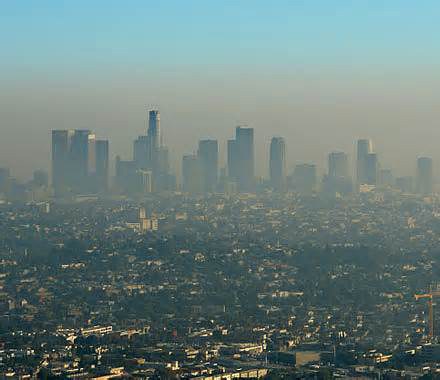|
查看原文
A new research describes how the brains of mice are damaged by exposure to air pollution in early life.
The brain damage includes the enlargement of a part of the brain that is seen in humans who have autismand schizophrenia.
The study is published in the journal Environmental Health Perspectives.
As in autism and schizophrenia, the changes occurred predominately in males. The mice also performed poorly in tests of short-term memory, learning ability, and impulsivity.
The new findings are consistent with several recent studies that have shown a link between air pollution and autism in children.
Most notably, a 2013 study in JAMA Psychiatryreported that children who lived in areas with high levels of traffic-related air pollution during their first year of life were three times as likely to develop autism.
“Our findings add to the growing body of evidence that air pollution may play a role in autism, as well as in other neurodevelopmental disorders,” said Deborah Cory-Slechta, Ph.D., professor of environmental medicine at the University of Rochester and lead author of the study.
In three sets of experiments, Cory-Slechta and her colleagues exposed mice to levels of air pollution typically found in mid-sized US cities during rush hour.
The exposures were conducted during the first two weeks after birth, a critical time in the brain’s development. The mice were exposed to polluted air for four hours each day for two four-day periods.
In one group of mice, the brains were examined 24 hours after the final pollution exposure. In all of those mice, inflammation was rampant throughout the brain, and the lateral ventricles —chambers on each side of the brain that contain cerebrospinal fluid —were enlarged two to three times their normal size.
“When we looked closely at the ventricles, we could see that the white matter that normally surrounds them hadn’t fully developed,” said Cory-Slechta.
“It appears that inflammation had damaged those brain cells and prevented that region of the brain from developing, and the ventricles simply expanded to fill the space.”
The problems were also observed in a second group of mice 40 days after exposure and in another group 270 days after exposure, indicating that the damage to the brain was permanent.
Brains of mice in all three groups also had elevated levels of glutamate, a neurotransmitter, which is also seen in humans with autism and schizophrenia.
Most air pollution is made up mainly of carbon particles that are produced when fuel is burned by power plants, factories, and cars. For decades, research on the health effects of air pollution has focused on the part of the body where its effects are most obvious —the lungs.
That research began to show that different-sized particles produce different effects. Larger particles, the ones regulated by the Environmental Protection Agency (EPA), are actually the least harmful because they are coughed up and expelled.
But many researchers believe that smaller particles known as ultrafine particles —which are not regulated by the EPA —are more dangerous, because they are small enough to travel deep into the lungs and be absorbed into the bloodstream, where they can produce toxic effects throughout the body.
That assumption led Cory-Slechta to design a set of experiments that would show whether ultrafine particles have a damaging effect on the brain, and if so, to reveal the mechanism by which they inflict harm. The study is the first scientific work to do both.
“I think these findings are going to raise new questions about whether the current regulatory standards for air quality are sufficient to protect our children,” said Cory-Slechta.
|
查看譯文
一項(xiàng)新研究表明,老鼠若在幼年期長(zhǎng)期接觸污染大氣,腦部可能會(huì)受損。
這種受損包括大腦某一部分變腫大,就人類而言,變腫大的部分常出現(xiàn)在自閉者與精神分裂患者腦中。
相關(guān)研究結(jié)果已發(fā)布在《環(huán)境健康透視》雜志上。
就自閉癥和精神分裂而言,這種變化更多出現(xiàn)在雄性之中。此外,試驗(yàn)中雄性小鼠的短期記憶、學(xué)習(xí)能力和沖動(dòng)性行為均有下降。
除本實(shí)驗(yàn)外,其他最近幾項(xiàng)研究也表明大氣污染可導(dǎo)致兒童自閉癥。
最顯著的是2013年《美國(guó)醫(yī)學(xué)協(xié)會(huì)雜志:精神病學(xué)分冊(cè)》上發(fā)表的一項(xiàng)研究,該研究顯示兒童若在一歲多時(shí)生活在交通尾氣污染嚴(yán)重地區(qū),患上自閉癥的概率是同齡兒童的三倍。
“隨著調(diào)查的深入,我們搜集到的證據(jù)也越來(lái)越多,這些數(shù)據(jù)一致表明大氣污染和自閉癥之間存在必然聯(lián)系,污染甚至還可能引發(fā)神經(jīng)系統(tǒng)發(fā)育障礙,”羅切斯特大學(xué)環(huán)境醫(yī)學(xué)教授德博拉?科里?斯徹塔解釋道。
在三組試驗(yàn)中,斯徹塔與同事采集了美國(guó)二線城市交通高峰期的空氣樣本,并將老鼠置于其中。
科里?斯徹塔用出生僅兩周的老鼠進(jìn)行試驗(yàn),此時(shí)正值其腦部發(fā)育的關(guān)鍵時(shí)期。試驗(yàn)期間,小鼠每天要呼吸污染的空氣長(zhǎng)達(dá)四個(gè)小時(shí),為期兩到四天,試驗(yàn)分為兩期進(jìn)行。
試驗(yàn)結(jié)束后,科里為第一組小鼠進(jìn)行了長(zhǎng)達(dá)二十四小時(shí)的腦部檢查。所有小鼠的大腦和側(cè)腦室均已嚴(yán)重發(fā)炎——左右腦的腦腔里都是腦脊髓液——小鼠的大腦增大兩至三倍。
“我們仔細(xì)檢查了小鼠的腦室,發(fā)現(xiàn)大腦的白質(zhì)未完全發(fā)育”,科里?斯徹塔說(shuō)道。
“我們觀察發(fā)現(xiàn)炎癥損害了小鼠的腦細(xì)胞,限制了大腦的發(fā)育,腦室不斷擴(kuò)張,占滿了整個(gè)大腦。”
科里?斯徹塔還在試驗(yàn)后40天和270天分別測(cè)試了第二和第三組小鼠,發(fā)現(xiàn)大氣污染對(duì)腦部造成的傷害是永久性的。
三組小鼠的腦內(nèi)的谷氨酸水平也明顯升高,谷氨酸是一種神經(jīng)遞質(zhì),如果人類腦部的谷氨酸水平過(guò)高,則會(huì)患上自閉癥和精神分裂。
空氣污染產(chǎn)生的主要原因是發(fā)電廠,工廠和汽車燃燒燃料后排放出的碳粒子。幾十年來(lái),在研究大氣污染對(duì)健康的影響時(shí),人們往往只關(guān)注病癥最明顯的部位——肺。
隨著研究的深入,研究人員漸漸發(fā)現(xiàn)不同大小的碳顆粒對(duì)大腦的損害不同。大型碳顆粒受美國(guó)環(huán)保局監(jiān)管,其實(shí)會(huì)被人體咳出或排出,危害最小。
但許多研究者認(rèn)為那些小型碳顆粒,又叫做超微顆粒——不受美國(guó)環(huán)境保護(hù)局監(jiān)管——其實(shí)危害更大,因?yàn)樾⌒吞碱w粒體積較小,可能會(huì)被吸入肺部或是融入血液,從而毒害人體。
為驗(yàn)證上述猜想,科里?斯徹塔設(shè)計(jì)了一系列實(shí)驗(yàn),探究超微粒子是否會(huì)危害大腦,如果答案是肯定的,科里還將深入研究超微碳粒子是如何危害人體的。科里結(jié)合了這兩方面來(lái)研究,開(kāi)創(chuàng)了先河。
“現(xiàn)在的空氣質(zhì)量的監(jiān)管標(biāo)準(zhǔn)能否保護(hù)我們的孩子呢?我覺(jué)得我的研究成果可能會(huì)起到警示的作用”,科里?斯徹塔說(shuō)道。
(譯者 rosemary02 編輯 丹妮)
掃一掃,關(guān)注微博微信
 
|

